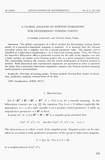Article
Full entry |
 PDF
(5.3 MB)
Feedback
PDF
(5.3 MB)
Feedback
 PDF
(5.3 MB)
Feedback
PDF
(5.3 MB)
Feedback
Keywords:
detection of turning points; Newton method; Newton flow; basins of attraction; qualitative analysis; normal forms of the flow; global convergence; singularity theory; bifurcation singularity; imperfect bifurcation
detection of turning points; Newton method; Newton flow; basins of attraction; qualitative analysis; normal forms of the flow; global convergence; singularity theory; bifurcation singularity; imperfect bifurcation
Summary:
The global convergence of a direct method for determining turning (limit) points of a parameter-dependent mapping is analysed. It is assumed that the relevant extended system has a singular root for a special parameter value. The singular root is clasified as a $bifurcation singularity$ (i.e., as a $degenerate$ turning point). Then, the Theorz for Imperfect Bifurcation offers a particular scenario for the split of the singular root into a finite number of regular roots (turning points) due to a given parameter imperfection. The relationship between the scenario and the actual performance of Newton method is studied. Both theoretical and experimental arguments are presented in order to quaetion the claim that a particular bifurcation singularity $organiyes$ the Newton method assuming small parameter perturbations.
References:
[1] Branin F.H.: A widely convergent method for finding multiple solutions of simultaneous non-linear equations. IBM J. Res. Develop. (1972), 504-522. DOI 10.1147/rd.165.0504 | MR 0418449
[2] Golubitski M., Schaeffer D.: Singularities and Groups in Bifurcation Theory Vol. 1. Springer Verlag, New York, 1985.
[3] Griewank A., Reddien G. W.: Characterisation and computation of generalised turning points. SIAM J. Numer. Anal. 21 (1984), 176-185. DOI 10.1137/0721012 | MR 0731221
[4] Guckenheimer J., Holmes P.: Nonlinear Oscillations, Dynamical Systems and Bifurcation of Vector Fields. Appl. Math. Sci. 42, Springer Verlag, New York, 1983. DOI 10.1007/978-1-4612-1140-2 | MR 0709768
[5] Janovský V., Seige V.: Qualitative analysis of Newton iterations for imperfect bifuracation singularities, I. A case study. submitted to SIAM J. Numer. Anal..
[6] Jepson A.D., Spence A.: Singular points and their computation. In: Numerical Methods for Bifurcation Problems (Küpper T., Mittelmann H. D., Weber H., eds.), vol. ISNM 70, Birkhäuser Verlag, Basel, 1984, pp. 502-514. MR 0821051 | Zbl 0579.65048
[7] Jepson A.D., Spence A.: A reduction process for nonlinear equations. SIAM J. Math. Anal 20 (1989), 39-56. DOI 10.1137/0520004 | MR 0977487 | Zbl 0685.58003
[8] Jongen H. Th., Jonker P., Twilt F.: A note on Branin's method for finding the critical points of smooth functions. In: Parameteric Optimization and Related Topics (Guddat J., Jongen H.Th., Kummer B., Nožička F., eds.), Akademie Verlag, Berlin, 1987, pp. 196-208. MR 0909730 | Zbl 0625.65067
[9] Keller H.В.: Numerical solution of bifurcation and nonlinear eigenvalue problems. In: Applications of Bifurcation Theory (Rabinowitz P.H. ed.), Academic Press, New York, 1977, pp. 359-384. MR 0455353 | Zbl 0581.65043
[10] Kubíček M., Marek M.: Evaluation of turning and bifurcation points for algebraic and nonlinear boundary value problems. Appl. Math. Соmр. 5 (1979), 106-121.
[11] Kubíček M., Marek M.: Computational Methods in Bifurcation Theory and Dissipative Structures. Springer Verlag, New York, 1983. MR 0719370
[12] Melhem R.G., Rheinbold W. C.: A comparison of methods for determining turning points of nonlinear equations. Computing 29 (1982), 201-226. DOI 10.1007/BF02241698 | MR 0680470
[13] Peitgen H.O., Prüfer M.: Global aspects of Newton's method for nonlinear boundary value problems. In: Numerical Methods for Bifurcation Problems (Küpper T., Mittelmann H. D., Weber H., eds.), vol. ISNM 70, Birkhäuser Verlag, Basel, 1984, pp. 352-368. MR 0821041 | Zbl 0539.65059
[14] Pönisch G., Schwetlick H.: Computing turning points of curves implicitly defined by nonlinear equations depending on a parameter. Computing 26 (1981), 107-121. DOI 10.1007/BF02241778 | MR 0619933
[15] Raschman R., Schreiber I., Marek M.: Periodic and aperiodic regimes in linear and cyclic arrays of coupled reaction diffusion cells. In: Lect. in Appl. Math. Vol. 24, pp. 61-100 (1986), AMS, Providence, RI. MR 0840077
[16] Saupe D.: Discrete versus continuous Newton's method. Acta Applicandae Mathematicae 13 (1988), 59-80. DOI 10.1007/BF00047502 | MR 0979817 | Zbl 0669.65037
[17] Smale S.: On the efficiency of algorithms of analysis. Bull. A.M.S. 13 (1985), 87-121. DOI 10.1090/S0273-0979-1985-15391-1 | MR 0799791 | Zbl 0592.65032
[18] Spence A., Werner В.: Nonsimple turning points and cusps. IMA. J. Numer. Anal. 2 (1982), 413-427. DOI 10.1093/imanum/2.4.413 | MR 0692288

